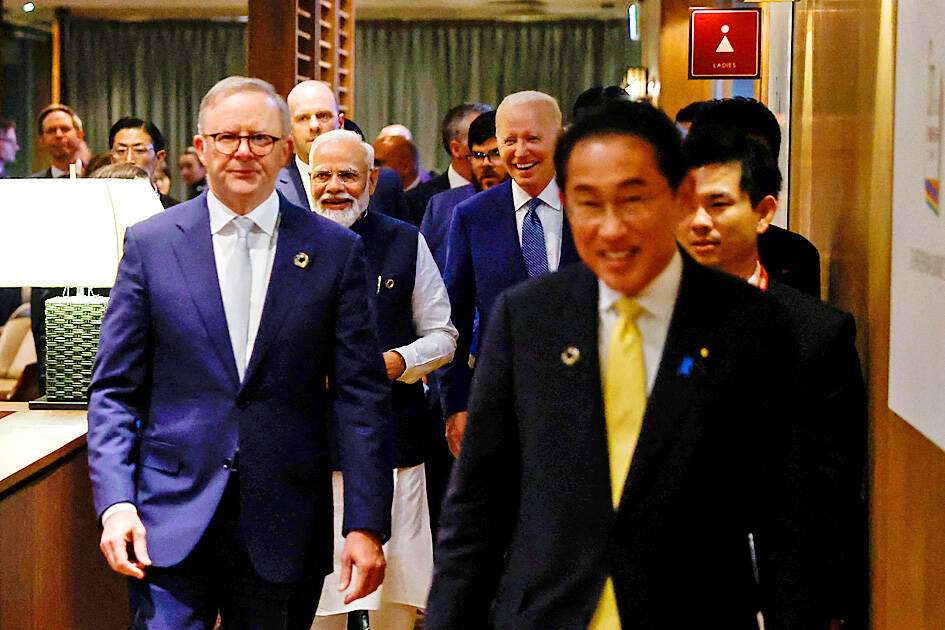G7 countries yesterday expressed “serious concern” about the situation in the East and South China seas, where Beijing has been expanding its military presence and threatening to use force to exert its control over Taiwan.
In a joint statement, the G7 leaders called for a “peaceful resolution” of China’s claim to Taiwan.
They said they did not want to harm China and were seeking “constructive and stable relations” with Beijing, “recognizing the importance of engaging candidly with and expressing our concerns directly to China.”

Photo: AFP
The statement said there was “no legal basis for China’s expansive maritime claims in the South China Sea, and we oppose China’s militarization activities in the region.”
“A growing China that plays by international rules would be of global interest,” the statement said, alluding to charges that Beijing is undermining the “rules-based international order.”
The G7 also united in voicing concerns about human rights in China, including in Tibet, Hong Kong and the far western region of Xinjiang, where forced labor is a perennial issue.
In Taipei, the Ministry of Foreign Affairs yesterday thanked the G7 for its “concrete course of action for three consecutive years that expressed their concern and emphasis on the peace and stability of the Taiwan Strait.”
As an important country in the Indo-Pacific region, Taiwan would continue to work with G7 members and other like-minded countries to bolster the “global democratic alliance,” uphold the rules-based international order, resist the oppression of authoritarianism, and maintain the liberty and openness of the Indo-Pacific region, as well as global peace, stability and prosperity, it said.
The G7 statement also called on Beijing to pursue peace in Ukraine.
“We call on China to press Russia to stop its military aggression, and immediately, completely and unconditionally withdraw its troops from Ukraine,” it said. “We encourage China to support a comprehensive, just and lasting peace based on territorial integrity and the principles and purposes of the UN Charter,” including in direct talks with Ukraine.
The statement also sought to counter accusations that the G7 is seeking to prevent China’s rise as a global power.
“Our policy approaches are not designed to harm China, nor do we seek to thwart China’s economic progress and development,” it said.
The statement highlighted a consensus that efforts to diversify manufacturing supply chains and ensure stable access to strategically vital minerals and other resources is not aimed at unraveling trade ties with the world’s second-largest economy.
“We are not decoupling or turning inwards,” the statement said. “At the same time, we recognize that economic resilience requires de-risking and diversifying. We will take steps, individually and collectively, to invest in our own economic vibrancy. We will reduce excessive dependencies in our critical supply chains.”
At the same time, the G7 members vowed to take a stand against “economic coercion,” saying they “will counter malign practices, such as illegitimate technology transfer or data disclosure,” while also avoiding “unduly limiting trade and investment.”
Additional reporting by staff writer

AIR SUPPORT: The Ministry of National Defense thanked the US for the delivery, adding that it was an indicator of the White House’s commitment to the Taiwan Relations Act Deputy Minister of National Defense Po Horng-huei (柏鴻輝) and Representative to the US Alexander Yui on Friday attended a delivery ceremony for the first of Taiwan’s long-awaited 66 F-16C/D Block 70 jets at a Lockheed Martin Corp factory in Greenville, South Carolina. “We are so proud to be the global home of the F-16 and to support Taiwan’s air defense capabilities,” US Representative William Timmons wrote on X, alongside a photograph of Taiwanese and US officials at the event. The F-16C/D Block 70 jets Taiwan ordered have the same capabilities as aircraft that had been upgraded to F-16Vs. The batch of Lockheed Martin

GRIDLOCK: The National Fire Agency’s Special Search and Rescue team is on standby to travel to the countries to help out with the rescue effort A powerful earthquake rocked Myanmar and neighboring Thailand yesterday, killing at least three people in Bangkok and burying dozens when a high-rise building under construction collapsed. Footage shared on social media from Myanmar’s second-largest city showed widespread destruction, raising fears that many were trapped under the rubble or killed. The magnitude 7.7 earthquake, with an epicenter near Mandalay in Myanmar, struck at midday and was followed by a strong magnitude 6.4 aftershock. The extent of death, injury and destruction — especially in Myanmar, which is embroiled in a civil war and where information is tightly controlled at the best of times —

China's military today said it began joint army, navy and rocket force exercises around Taiwan to "serve as a stern warning and powerful deterrent against Taiwanese independence," calling President William Lai (賴清德) a "parasite." The exercises come after Lai called Beijing a "foreign hostile force" last month. More than 10 Chinese military ships approached close to Taiwan's 24 nautical mile (44.4km) contiguous zone this morning and Taiwan sent its own warships to respond, two senior Taiwanese officials said. Taiwan has not yet detected any live fire by the Chinese military so far, one of the officials said. The drills took place after US Secretary

THUGGISH BEHAVIOR: Encouraging people to report independence supporters is another intimidation tactic that threatens cross-strait peace, the state department said China setting up an online system for reporting “Taiwanese independence” advocates is an “irresponsible and reprehensible” act, a US government spokesperson said on Friday. “China’s call for private individuals to report on alleged ‘persecution or suppression’ by supposed ‘Taiwan independence henchmen and accomplices’ is irresponsible and reprehensible,” an unnamed US Department of State spokesperson told the Central News Agency in an e-mail. The move is part of Beijing’s “intimidation campaign” against Taiwan and its supporters, and is “threatening free speech around the world, destabilizing the Indo-Pacific region, and deliberately eroding the cross-strait status quo,” the spokesperson said. The Chinese Communist Party’s “threats